Mercados
Al diseñar una intervención humanitaria y decidir si se utilizan los PTM, el análisis de mercado debe ser parte del análisis global de la respuesta. Se ha demostrado que apoyar a los mercados para que funcionen bien conduce a una recuperación más rápida y a una mayor resiliencia en zonas afectadas por desastres.
Muchas organizaciones han invertido en el desarrollo de herramientas de apoyo para el análisis de mercado y están considerando la programación basada en el mercado de forma más integral. Esto incluye intervenciones que utilizan los mercados (como las transferencias en efectivo a poblaciones afectadas), así como intervenciones que apoyan directamente a los mercados (como subvenciones condicionales a los comerciantes para recuperar su mercado y mantenerlos funcionando).
Iniciativas relacionadas
Contenido destacado

Introduction to Market Analysis
Curso
This 30 minute online course provides an introduction to the analysis of markets in emergency contexts, with input from some of the world’s leading thinkers on the topic.

A Practical Guide to Market Analysis in Humanitarian response
Curso
A three to four hour online course designed to provide future humanitarian market assessment team members with a solid understanding of theory and steps of market assessments so that they can join assessment teams prepared with a basic understanding of what they will be doing and why.
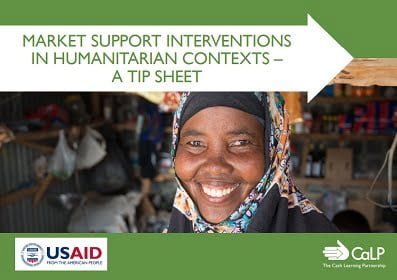
Market Support Interventions in Humanitarian Contexts – a Tip Sheet
Guidelines and Tools
This tip sheet defines what market support programming in humanitarian contexts is, and what it can look like in practice. It enables humanitarian practitioners to systematically consider market support interventions alongside other programme activities. The scope includes support interventions focusing on supply/availability and on demand/access. The tip sheet is based on secondary data...
Líder temático
Últimos recursos

Calculating the GHG Footprint of Food Aid using Cash Transfers
Case Study
In early 2021, Action Against Hunger (ACF) France is launching a GHG emissions assessment with other members of the Humanitarian Environment Network (REH). The scope of accounting target all emissions, and very quickly some activities, which can generate considerable variability in the results, are...

Cash Feasibility Snapshot Report – Site Assessment (Round 34) and Village Assessment Survey (Round 17), August – September 2023
Report
Between August and September 2023, the International Organization for Migration (IOM) Data and Research Unit (DRU), through its Displacement Tracking Matrix (DTM) methodology, deployed the Site Assessment (SA) and Village Assessment Survey (VAS) tools to assess the mobility, needs and vulnerabilities of...

Joint Market Assessment Round 2
Report
This report assesses the feasibility of implementing Cash and Voucher Assistance (CVA), specifically Multipurpose Cash Assistance (MPCA), to support individuals impacted by the February 6 earthquakes. The evaluation focuses on the acceptance of various forms of cash modalities, availability of key items,...

Feasibility study on CVA in Tigray Region, Ethiopia_October 2023
Report
The two years of conflict in Tigray has fueled a large-scale humanitarian crisis and resulted in loss of livelihoods and widespread food insecurity of the population especially Internally Displaced Populations and agrarian communities in the region.
The crisis affected the livelihoods of the...

WVI Cash Roadmap 2.0 – New Avenues – Leveraging, multiplying “Nexus” cash to take children and their families further than imagined
Policy paper
WVI's strategic global Cash Roadmap 2.0 (2024-2027) speaks to the organisations' commitment that amidst polycrises and resourcing constraints, there is urgency to maximise and multiply World Vision's capabilities, assets and cash voucher programming (CVP=CVA) is a powerful tool to do so.
Increasing...
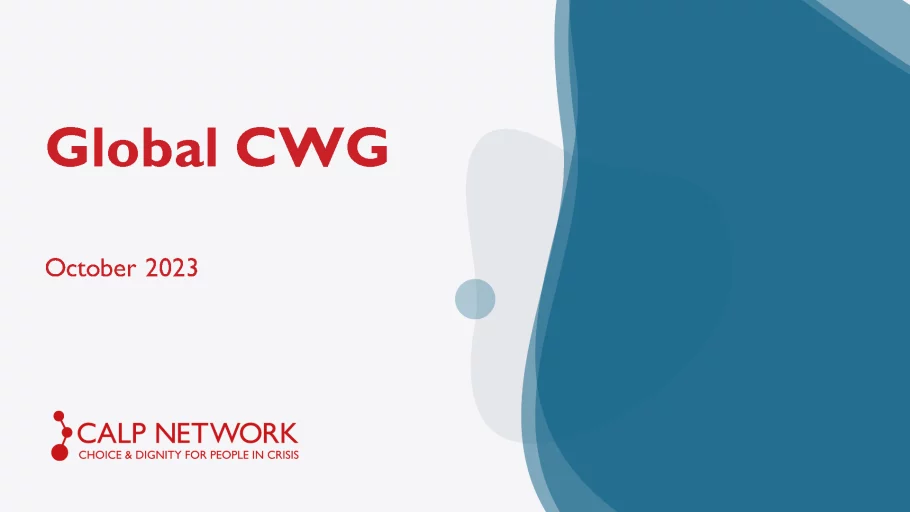
Global Cash Working Group Meeting – October 2023
Presentation
This slide deck was presented at the October meeting of the Global Cash Working Group meeting.
During the October meeting, we:
Launched the process to update the Terms of Reference of the GCWG to clarify its purpose and linkages to other structures, particularly given the role out of the 2022...
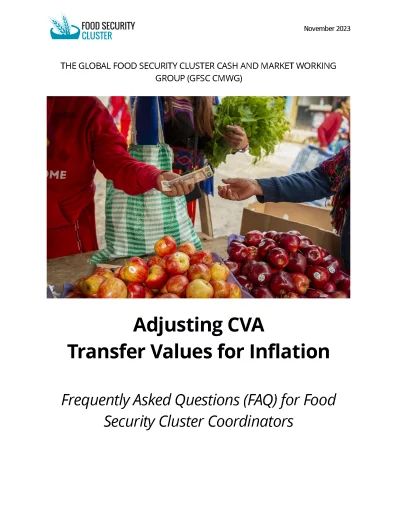
Adjusting CVA Transfer Values for Inflation: Frequently Asked Questions (FAQs) for Food Security Cluster Coordinators
Guidelines and Tools
Over the past 3 years, the global community has experienced a series of unanticipated, challenging, and interrelated shocks: COVID-19, conflict, climate change, and rising costs. A significant number of countries experienced substantial levels of local currency depreciation coupled with high inflation,...
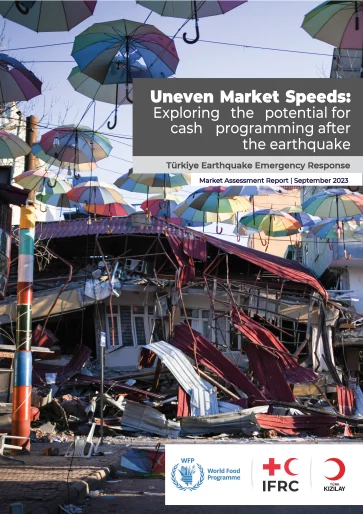
Uneven Market Speeds: Exploring the potential for cash programming after the earthquake
Report
The Kahramanmaraş earthquake had a devastating impact on Türkiye’s South-East Anatolia region. In an area within Türkiye already reported as economically vulnerable, the earthquake severely impacted people’s livelihoods, as well as the resilience of markets through the destruction of essential...

Layering Cash Into Market Systems Programs: Catalyzing Market-Driven Recovery in Nigeria
Case Study
Mercy Corps has been implementing the USAID funded Feed the Future Nigeria Rural Resilience Activity (RRA), a market systems development (MSD) program, in Northeast Nigeria since 2019. In response to COVID-19, RRA layered on a short-term cash transfer activity to help households cope, jumpstart local...

Building Capital in Crisis: How women in CARE’s VSLAs in Emergencies increase savings and solidarity
Report
Since 2017, CARE has piloted and refined our VSLA in Emergencies model to reach people in need of humanitarian assistance and provide an approach that can reduce long term vulnerability while being more sustainable. In this second report on our pilot research, we provide insights from three pilots in...
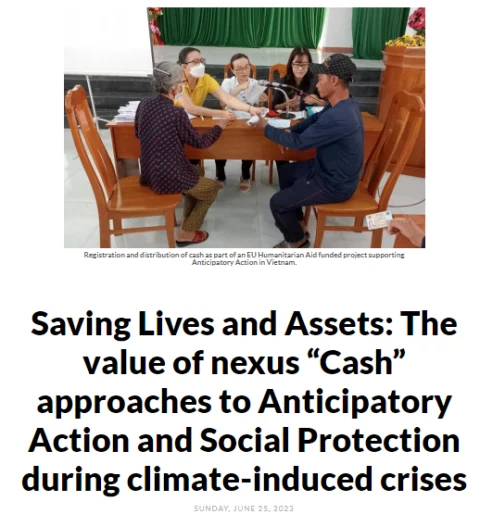
Saving Lives and Assets: The value of nexus “Cash” approaches to Anticipatory Action and Social Protection during climate-induced crises
Report
As a follow-on reflection from an inter-agency panel presentation at the ECHO EHF 2023, panelists highlight the importance of drastically changing “gear” to scale up pre-crisis Anticipatory Action investment, leveraging the “nexus” enabler – cash. Humanitarian needs have reached an unprecedented...
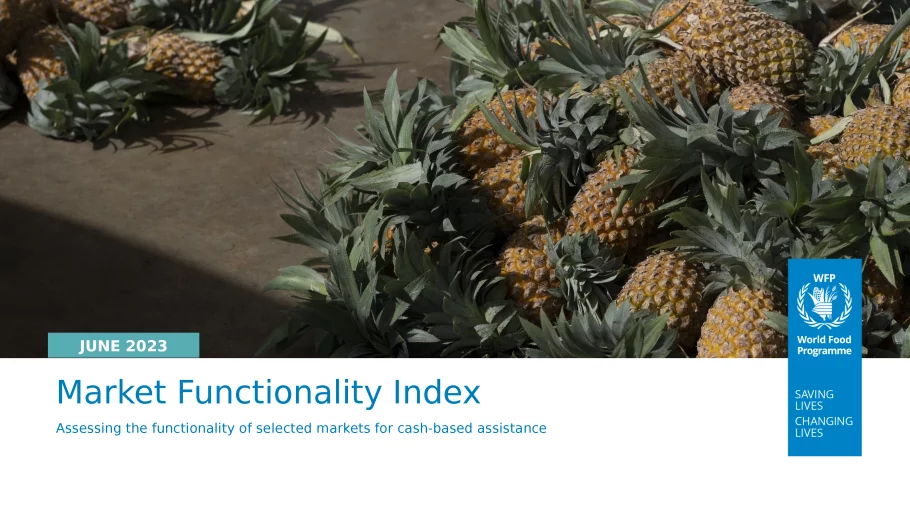
Market Functionality Index: Assessing the functionality of selected markets for cash-based assistance
Case Study
Markets are functional. While there remain variations from market to market, Sri Lanka’s markets currently have a wide range of products, adequate physical availability of essential goods, a resilient supply chain and sufficient levels of hygiene and cleanliness. Overall market functionality remains...

Layering Cash into Market Systems Programs: Catalyzing market-driven recovery in Nigeria
Case Study
This paper examines the case of the Nigeria Rural Resilience Activity (RRA), a five-year, US$49 million Activity funded by the United States Agency for International Development (USAID) Feed the Future portfolio within the states of Borno, Adamawa, Yobe and Gombe (BAY-G) in North Eastern Nigeria (NEN) and...

Investigating Operational Models for Multi-purpose Cash Delivery and Links to Social Protection: Spotlight on the Middle East and North Africa
Report
This piece of research looked at six case studies in the MENA region where CVA is being delivered at scale. It looked at the characteristics of the operational models of delivering multi-purpose cash assistance (MPCA), and how that enables (or not) links with existing national social protection...
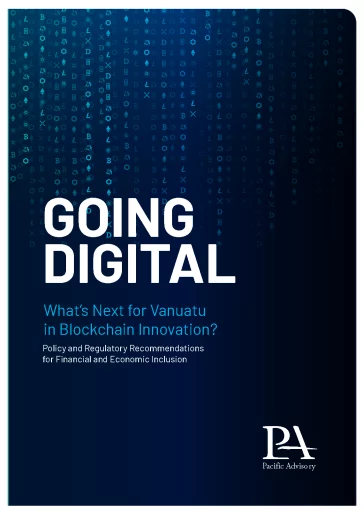
Going digital: What’s next for Vanuatu in blockchain innovation?
Report
Today, the level of impact and user and stakeholder interest in the UnBlocked Cash Project clearly demonstrates a need to look closely at how this effort makes a case for broader and longer-term sustainable adoption of blockchain technology for financial and economic inclusion. To do so, Oxfam, Pacific...
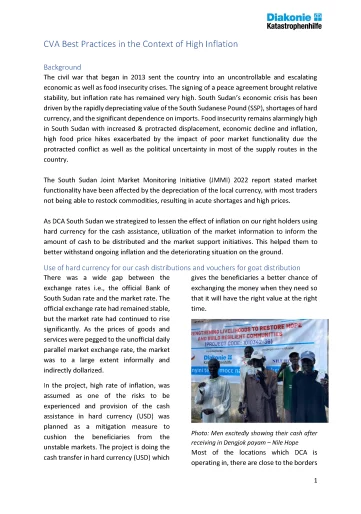
CVA in context of high inflation: South Sudan
Report
The civil war that began in 2013 sent South Sudan into an uncontrollable and escalating economic as well as food insecurity crises. The signing of a peace agreement brought relative stability, but inflation rate has remained very high. South Sudan’s economic crisis has been driven by the rapidly...

Respuesta al terremoto de Turquía y Siria: consejos y recursos para profesionales de PTM
Blog Post
Basándonos en el aprendizaje de crisis comparables, hemos recopilado información y consejos útiles para cualquier persona involucrada en los programas de transferencias monetarias (PTM) en Turquía y Siria después de los recientes terremotos.

Coordinating with the Petrol Sector to Enhance Early Warning
Case Study
For far too long humanitarian actors and coordination mechanisms have witnessed sharp price variations of core commodities without the capacity to forecast them. While to date some Cash and Vouchers Working Groups (e.g., Afghanistan) establish mechanisms to continue monitoring and adapt transfer values in...

Key principles and recommendations for inclusive cash and voucher assistance
Guidelines and Tools
This technical brief is intended to provide general guidance for humanitarian agencies to implement Disability Inclusive Cash and Voucher Assistance (CVA), mainstreaming disability in the intervention in line with the CRPD and with the “must do” action listed in the IASC guidelines on inclusion of...
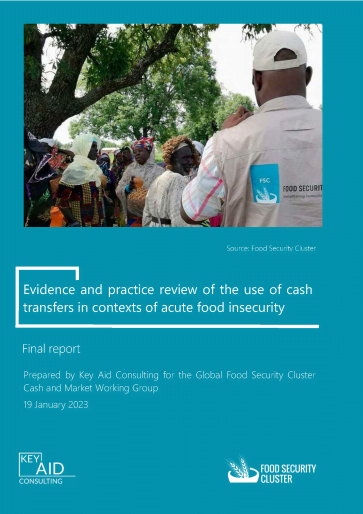
Evidence and practice review of the use of cash transfers in contexts of acute food insecurity
Report
Commissioned by the Global Food Security Cluster Cash and Market Working Group, this piece of operational looks at the use of cash transfers in contexts of extreme food insecurity. With interviews collected with partners in Syria, Nigeria and Somalia it seeks to highlight and understand lessons learned...



